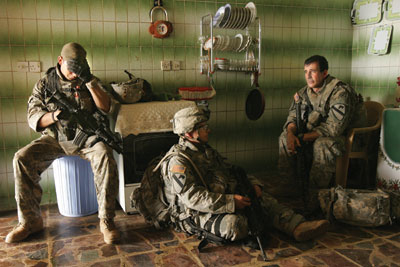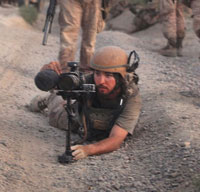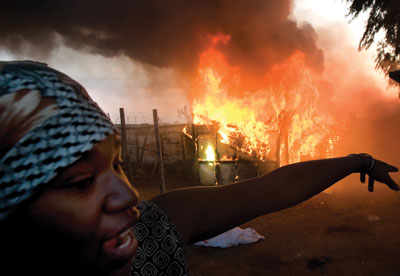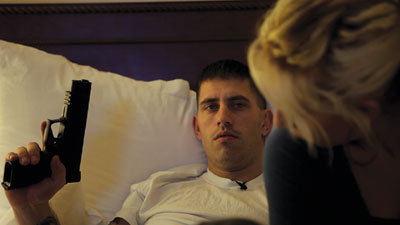 War photographer Danfung Dennis '04, BS Ag '05, has captured images from conflicts around the world. In the summer of 2009, he shifted his focus to film: embedded with Marines during the Afghan troop surge, he shot footage that would become the documentary Hell and Back Again. His freshman effort—in which Dennis not only chronicles the war, but follows one Marine's struggle to assimilate back into civilian life— has garnered major honors, including an Oscar nod and the Grand Jury Prize at Sundance. "I wanted to weave those two worlds together to show that they're just one experience," he says, "that the fighting doesn't stop when these men return home."
War photographer Danfung Dennis '04, BS Ag '05, has captured images from conflicts around the world. In the summer of 2009, he shifted his focus to film: embedded with Marines during the Afghan troop surge, he shot footage that would become the documentary Hell and Back Again. His freshman effort—in which Dennis not only chronicles the war, but follows one Marine's struggle to assimilate back into civilian life— has garnered major honors, including an Oscar nod and the Grand Jury Prize at Sundance. "I wanted to weave those two worlds together to show that they're just one experience," he says, "that the fighting doesn't stop when these men return home."
Documentarian Danfung Dennis '04, BS Ag '05, explores the toll of war, on and off the battlefield

By Beth Saulnier
Photographs by Danfung Dennis
Photojournalist Danfung Dennis '04, BS Ag '05, was 7,000 miles from his native Ithaca—caught in a downpour while walking the streets of Beijing—when he realized that his destiny lay somewhere just as far from home, but infinitely more dangerous. "I had been mulling it over for a long time—those esoteric questions of, 'What is my purpose? Can I contribute? Is it worth the risk?'" he recalls. "I took shelter underneath this little market stall, and decided that I was going to go to Afghanistan to cover the war."

With no contacts beyond the e-mail addresses of a few photo editors, Dennis booked a one-way ticket to Kabul in May 2006. "I brought my cameras and my backpack," he says. "I had the name of a hotel where I was going to stay, but that was about it." Dennis had scarcely landed in Kabul when he saw a BBC report of violent rioting over the deaths of five Afghanis killed in the crash of an American military truck. He hired a taxi to take him to the site of the riots, where he joined a band of angry youths. "If I'd been more experienced, I would have left at that point," he notes, "but I didn't know any better."
The crowd gathered around a mural of President Hamid Karzai, chanting "Death to America!" and "Death to Karzai!" Then their anger turned on the only foreigner in their midst; a man ran at Dennis with a broken shovel while another pinned his arms behind his back. He managed to break free—and ran for his life. "Mobs are unpredictable and irrational, and their anger is contagious," Dennis observes. "I heard this roar and trembling of people behind me. I raced through the streets of Kabul without knowing where I was going." Suddenly, a car pulled out of an alleyway; the driver opened the door, Dennis jumped in, and his impromptu rescuer spirited him to a radio station, where he hid in a back room. "At the end of the day I went back to my hotel," he says. "There were cars burning in the streets and people had been killed, a hundred injured. I sent my pictures to New York and they were published in the Times. So that was my big break."
Thus began Dennis's career as a war photographer—a calling that would take him not only to the battlefields of Afghanistan and Iraq, but to the rural American South and to the rarefied heights of Park City, Utah. In addition to capturing images that have appeared in such publications as the Times, Newsweek, USA Today, the International Herald Tribune, and Rolling Stone, Dennis has made a documentary, Hell and Back Again, that won the Grand Jury Prize at the Sundance Film Festival and was nominated for an Academy Award.

The film—which had theatrical releases in about twenty cities—is available on DVD and iTunes, among other media, and will be broadcast by PBS on Memorial Day. It opens with the troop surge that was aimed to turn the tide of the Afghan war in the summer of 2009: 4,000 Marines were dropped into an insurgent stronghold in the largest helicopter-borne assault since Vietnam. Toting a compact, custom-built recording system, Dennis was embedded with Echo Company of the U.S. Marine Corps's second battalion. "I remember getting a cryptic e-mail: 'You need to be in Kandahar by midnight on this day,' " Dennis says. "Echo Company was going the furthest south of the entire battalion; they were going to seize a key objective. Shortly after landing we moved into a village, the Marines were surrounded by insurgents, and a heavy fight ensued. After that first day, one Marine was dead and a dozen had collapsed from exhaustion. Nearly all of us had run out of water. In all my years of working there, it was one of the most dire situations I'd been in."
That's when Dennis met Sergeant Nathan Harris—a stranger who offered to share his water. "I could tell he was an exceptional leader," Dennis says. "I followed him as he pushed further into this stronghold, and got to know him quite well. We slept in the same dust and went out on the same combat missions." Harris would go on to become the focus of Dennis's film—not just for his battlefield courage, but for what he faced when he got home. Days before his third tour was to end, the twenty-five-year-old Marine had been severely injured. He'd nearly bled to death after a bullet shattered his hip and thigh, undergoing multiple surgeries before being sent home to recuperate. "He was in extreme pain and distress, and was feeling very guilty for having left his men behind, yet he invited me to his hometown—Yadkinville, North Carolina," Dennis recalls. "He introduced me to his wife, Ashley, and his friends and family, as 'this guy who was over there with me.' I was accepted into this rural Baptist community, and I essentially lived with Nathan and Ashley during his recovery—and more importantly, his psychological transition back into a community that had very little understanding of what he had been through. It became a psychological portrait of what it means to come home."

In battle, Harris had been a leader of men; now he was disabled, dependent on pain medication, forced to rely on his high school sweetheart for basics like driving and dressing, and profoundly disoriented by an America that seemed obsessed with shopping but utterly unaware of what its troops were enduring abroad. "When you're over there, you just want to go home; then when you go home, you just want to go back," Dennis says. "I realized that the experience of war isn't simply what happens in battle. It's as much about reintegration into society. After you've been exposed to that type of trauma and been a warrior, you're a different breed."
In the film, Dennis cuts back and forth between Nathan's experiences in Afghanistan and in North Carolina—sometimes blurring the boundary between the two, as when the soundtrack of war obliterates the chatter of a fast-food drive-thru that has Harris doubled over with barely controlled fury. "Over there, what they were doing had purpose, had meaning," Dennis observes. "But when they get back, everything seems almost mundane, trivial, and it's hard to reconcile the two. For that reason, many do go back; it's a simpler life over there. The world of mortgages and relationships can be overwhelming. I wanted to weave those two worlds together to show that they're just one experience—that the fighting doesn't stop when these men return home."
And though Dennis carried a camera instead of a rifle, he admits that he's struggled with some of the same adjustment issues. "When I'm working there, everything seems critically important because people's lives are on the line," he says. "It was almost more disturbing when I got home and saw the complete indifference to the war. It was easy for people to think of it as a faraway abstraction that didn't affect their daily lives."
The film has garnered accolades from critics and audiences alike. As of January, it had a rare "100 percent fresh" rating on the review aggregation website Rotten Tomatoes; the Los Angeles Times called it "a hauntingly bifurcated work" and "a full-circle portrait of rare psychological immediacy and even rarer aesthetic command." In October, Dennis returned to campus for a packed screening at Cornell Cinema. "Danfung was a particularly inspiring guest, given all that he's accomplished in such a short time," says cinema director Mary Fessenden. "He's clearly very disciplined and dedicated to the idea of making a difference with the work he does. You can see this in Hell and Back Again, which sets itself apart from other war-related documentaries with its amazing cinematography and for not being overtly political."


